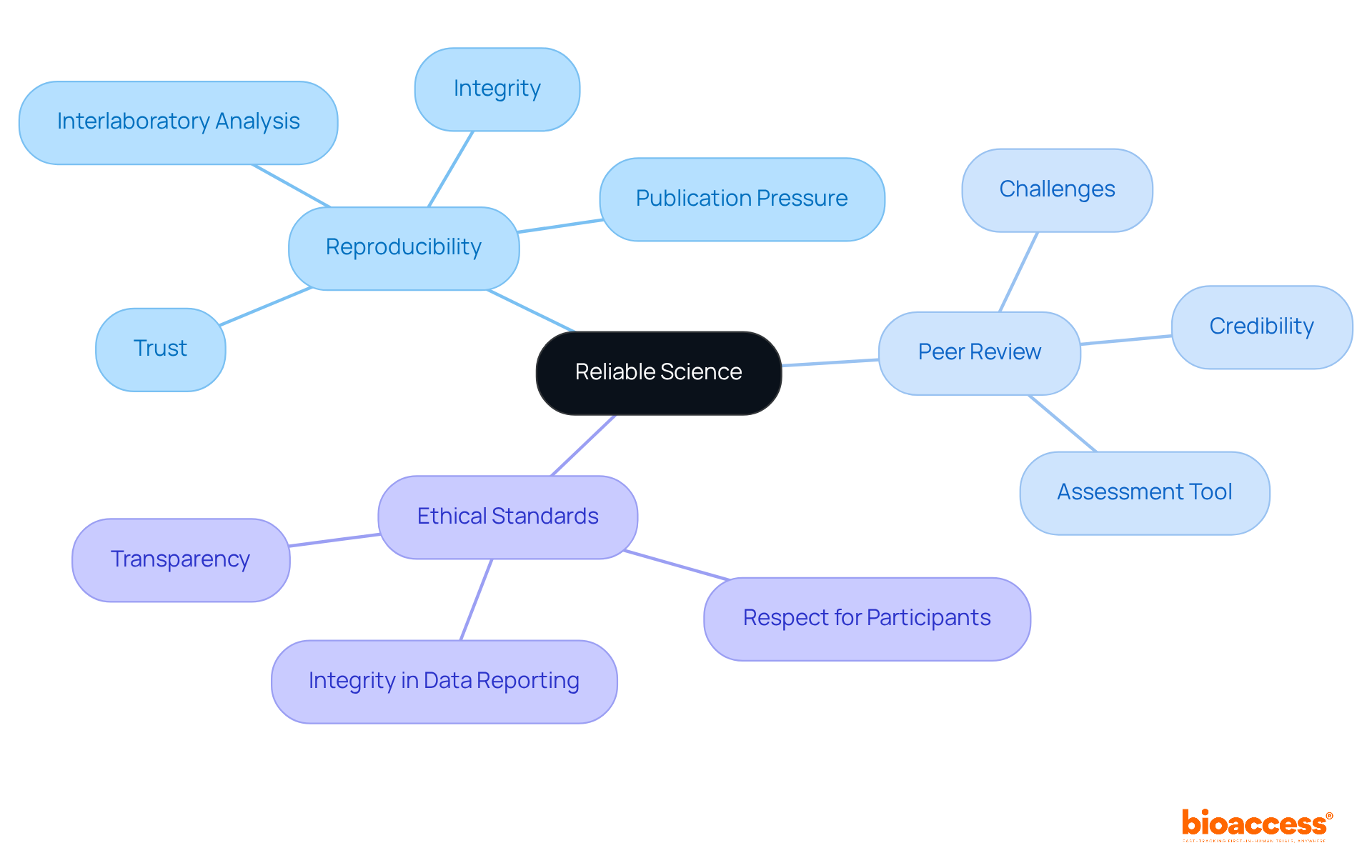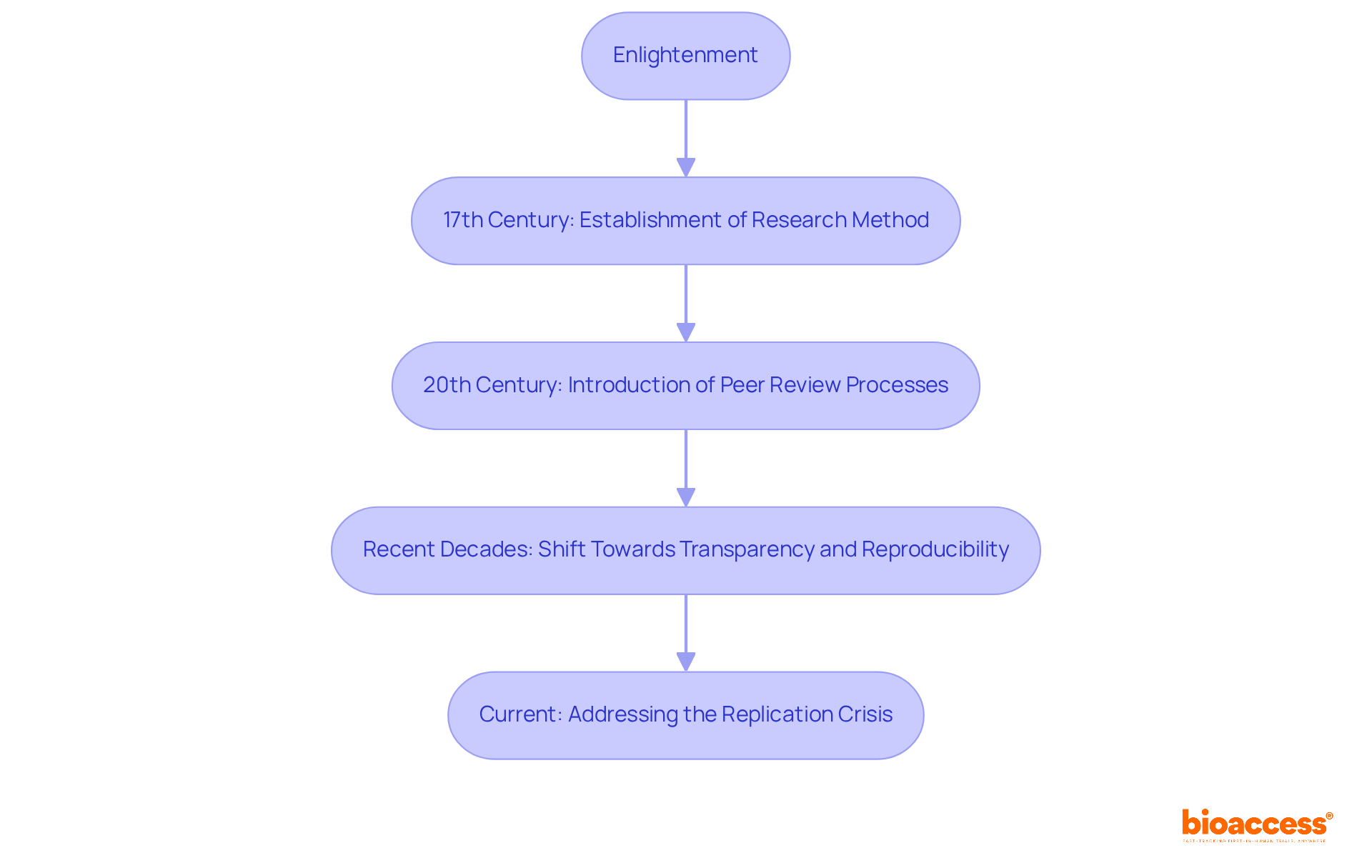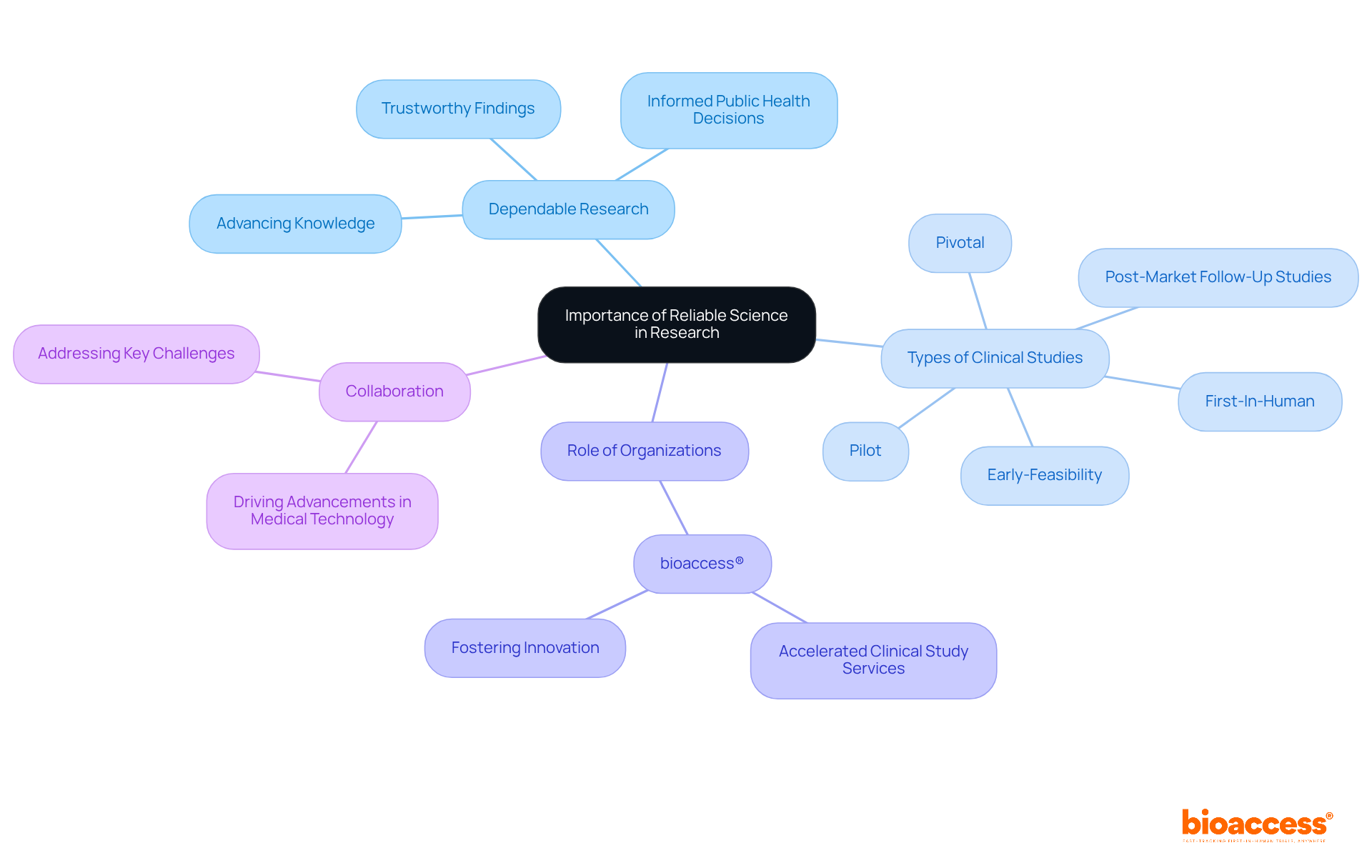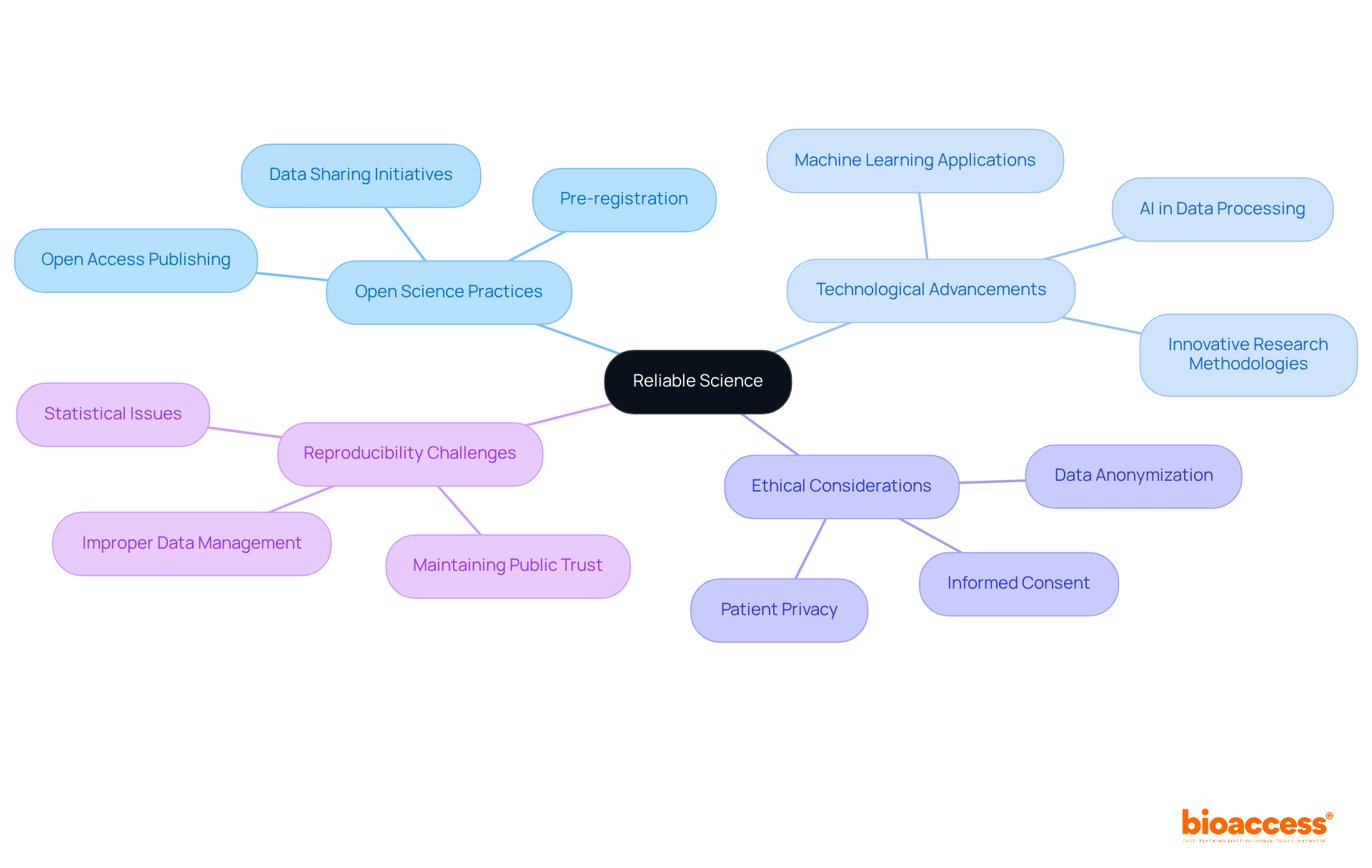


This article defines reliable science, highlighting its core principles, historical evolution, and significance in research practices. Reliable science is underpinned by essential principles such as reproducibility, peer review, and ethical standards. These elements collectively foster trust and validity in scientific inquiry. The discussion includes the replication crisis, emphasizing the critical importance of transparency in research methodologies.
Understanding reliable science is crucial for advancing clinical research. It not only establishes a foundation for credible findings but also addresses the challenges faced in the Medtech landscape. By adhering to these principles, researchers can enhance the integrity of their work and contribute to more effective solutions in healthcare.
In conclusion, collaboration among researchers, institutions, and stakeholders is vital. By prioritizing reliable science, we can ensure that research practices lead to meaningful advancements in clinical outcomes. The next steps involve fostering an environment that values transparency and ethical standards in all scientific endeavors.
The foundation of scientific inquiry is built on the principles of reliability, yet the definition of what constitutes reliable science has evolved significantly over the centuries. The ongoing replication crisis underscores the challenges in reproducibility and integrity, making it essential for both researchers and the public to grasp the core tenets of reliable science.
How can the scientific community effectively navigate these complexities to ensure that findings are not only trustworthy but also transformative in advancing knowledge across various fields? This question is pivotal as we explore the landscape of clinical research and the role of collaboration in overcoming key challenges.
A reliable science definition stands as a pillar of rigorous research practices, transparency, and adherence to established scientific methodologies. At its core are principles such as repeatability, peer review, and ethical standards. Reproducibility is crucial; it ensures that results can be consistently replicated under similar conditions, validating findings across different studies. For instance, a significant study revealed that only 36% of replication attempts in psychology yielded significant results, underscoring the challenges in achieving reproducibility.
Miyako Rogers emphasizes that integrity and trust in scientific findings hinge on reproducible results. Peer review serves as an essential assessment tool by specialists in the domain, bolstering the credibility of findings. However, statistics indicate that 62.43% of U.S. social science scholars recognize publication pressure as a notable factor in the replication crisis, suggesting that the peer review process may not consistently uphold scholarly integrity. Patrick Diaba-Nuhoho notes that periodic interlaboratory analysis can aid in ensuring reproducibility, highlighting the importance of collaborative efforts in enhancing the integrity of studies.
Ethical standards govern the conduct of investigations, ensuring that studies are designed and executed with respect for participants and integrity in data reporting. Collectively, these principles form the foundation of what is known as a reliable science definition, fostering trust and validity in scientific exploration while addressing ongoing challenges within the scholarly community. The broader implications of the reproducibility crisis are significant, with estimates suggesting that irreproducible research wastes approximately $28 billion annually in the U.S. This underscores the urgency of tackling these issues head-on.

The evolution of reliable science definition has been profound since the Enlightenment, a period when empirical observation began to overshadow mere speculation. The establishment of the research method in the 17th century marked a crucial turning point, highlighting the significance of systematic experimentation and observation. As we moved into the 20th century, the introduction of peer review processes further bolstered the standards of dependability in scholarly studies.
In recent decades, there has been a notable shift towards transparency and reproducibility, particularly in response to the replication crisis that has emerged across various scientific fields. This crisis has prompted a critical reassessment of practices, ensuring that results meet the reliable science definition and are not only reliable but also valid. As we navigate the complexities of clinical research today, understanding these developments is essential for fostering trust and credibility in scientific inquiry.

Dependable research is fundamental to advancing knowledge across disciplines, particularly in medicine, environmental studies, and technology. It ensures that research findings can be trusted according to a reliable science definition, which is essential for informing public health decisions and policy-making. For instance, clinical trials adhering to rigorous scientific principles, such as the first-in-human VenoValve® study presented by Dr. Jorge Hernando Ulloa at the Charing Cross International Symposium, lead to effective treatments and interventions that ultimately enhance patient outcomes.
Organizations like bioaccess® play a crucial role in this landscape by providing accelerated medical device clinical study services in Latin America. They specialize in:
This expertise fosters innovation by establishing a solid foundation for new discoveries, enabling researchers to build upon previous work with confidence. In an era where misinformation can spread rapidly, bioaccess's commitment to thorough clinical trials serves as a safeguard against unverified assertions and pseudoscience, highlighting the essential role of a reliable science definition in ensuring trustworthy research.
As we navigate the complexities of clinical research, collaboration becomes increasingly vital. By partnering with organizations like bioaccess, researchers can address key challenges and drive advancements in medical technology. The next steps involve leveraging this expertise to ensure that clinical trials not only meet regulatory standards but also contribute meaningfully to patient care and public health.

Current trends in dependable science underscore the critical implementation of open science practices, which significantly enhance the transparency and accessibility of data. Initiatives such as pre-registration of studies and open access publishing are gaining traction, fostering greater scrutiny and collaboration among researchers. The U.S. federal government's declaration of 2023 as the 'Year of Open Science' highlights the increasing importance of these practices in the scientific community.
Moreover, advancements in technology, particularly artificial intelligence and machine learning, are revolutionizing investigative methodologies, leading to improved data analysis and interpretation. For example, the integration of AI has demonstrated its ability to enhance the efficiency of data processing in clinical research settings. As we look to the future, dependable research is expected to prioritize repeatability and ethical considerations, alongside a commitment to interdisciplinary cooperation to tackle complex global challenges.
The National Academies of Sciences, Engineering, and Medicine emphasize the urgent need to address reproducibility challenges, which are vital for maintaining public trust in research outcomes. As the scientific community navigates these advancements, the foundational principles of a reliable science definition will continue to steer research practices and uphold the integrity of scientific inquiry.

A comprehensive understanding of reliable science is essential for fostering trust and integrity in research practices. Reliable science is defined by core principles such as reproducibility, peer review, and ethical standards, which collectively ensure the validity of scientific findings. These foundational elements not only enhance the credibility of research but also address significant challenges, including the ongoing replication crisis that threatens the integrity of various scientific fields.
The historical evolution of reliable science, from the Enlightenment era to contemporary practices, highlights a crucial shift towards transparency and reproducibility. Organizations like bioaccess play a vital role in supporting dependable research through rigorous clinical trials, illustrating the importance of adhering to established scientific methodologies. Furthermore, current trends such as open science practices and advancements in technology are set to reshape the future of reliable science, ensuring that ethical considerations and interdisciplinary collaboration remain at the forefront of scientific inquiry.
As the scientific community continues to evolve, embracing the principles of reliable science is crucial for addressing complex global challenges and maintaining public trust in research outcomes. The call to action is clear: researchers, institutions, and organizations must prioritize these principles to enhance the reliability of scientific studies and safeguard against misinformation. By doing so, the integrity of scientific exploration can be preserved, ultimately benefiting society as a whole.
What is the definition of reliable science?
Reliable science is defined as a pillar of rigorous research practices, emphasizing transparency and adherence to established scientific methodologies. It is built on core principles such as repeatability, peer review, and ethical standards.
Why is reproducibility important in scientific research?
Reproducibility is crucial because it ensures that results can be consistently replicated under similar conditions, validating findings across different studies. It helps establish trust in scientific results.
What percentage of replication attempts in psychology yielded significant results, according to a significant study?
The study revealed that only 36% of replication attempts in psychology yielded significant results, highlighting challenges in achieving reproducibility.
How does peer review contribute to scientific integrity?
Peer review serves as an essential assessment tool by specialists in the domain, bolstering the credibility of findings. However, it is noted that publication pressure may affect the integrity of the peer review process.
What percentage of U.S. social science scholars recognize publication pressure as a factor in the replication crisis?
Statistics indicate that 62.43% of U.S. social science scholars recognize publication pressure as a notable factor contributing to the replication crisis.
What role does interlaboratory analysis play in ensuring reproducibility?
Periodic interlaboratory analysis can aid in ensuring reproducibility, as highlighted by Patrick Diaba-Nuhoho, emphasizing the importance of collaborative efforts in enhancing the integrity of studies.
What ethical standards govern scientific investigations?
Ethical standards ensure that studies are designed and executed with respect for participants and integrity in data reporting, which is vital for maintaining trust in scientific research.
What are the broader implications of the reproducibility crisis?
The reproducibility crisis has significant implications, with estimates suggesting that irreproducible research wastes approximately $28 billion annually in the U.S., underscoring the urgency of addressing these issues.